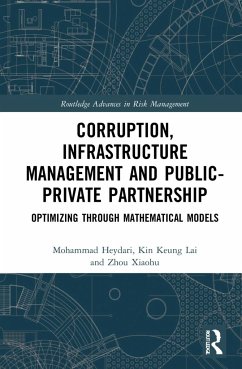
Risk Management in Public-Private Partnerships
Versandkostenfrei!
Versandfertig in 6-10 Tagen
45,99 €
inkl. MwSt.
Weitere Ausgaben:

PAYBACK Punkte
23 °P sammeln!
Public-Private Partnership (PPP) is a channel through which the public sector can seek alternative funding and expertise from the private sector to procure public infrastructure. Governments around the world are increasingly turning to Public-Private Partnerships to deliver essential goods and services. Unfortunately, PPPs, like any other public procurement, can be at risk of corruption. This book begins by looking at the basics of PPP and the challenges of the PPP process. It then conceptualizes the vulnerability of various stages of Public-Private Partnership models and corruption risk again...
Public-Private Partnership (PPP) is a channel through which the public sector can seek alternative funding and expertise from the private sector to procure public infrastructure. Governments around the world are increasingly turning to Public-Private Partnerships to deliver essential goods and services. Unfortunately, PPPs, like any other public procurement, can be at risk of corruption. This book begins by looking at the basics of PPP and the challenges of the PPP process. It then conceptualizes the vulnerability of various stages of Public-Private Partnership models and corruption risk against the backdrop of contract theory, principal-agent theory and transaction cost economics. The book also discusses potential control mechanisms.
The book also stresses the importance of good governance for PPP. It outlines principles and procedures of project risk management (PRM) developed by a working party of the Association of Project Managers. Finally, the book concludes by proposing strategies and solutions to overcome the limitations and challenges of the current approach toward PPP.
The book also stresses the importance of good governance for PPP. It outlines principles and procedures of project risk management (PRM) developed by a working party of the Association of Project Managers. Finally, the book concludes by proposing strategies and solutions to overcome the limitations and challenges of the current approach toward PPP.














